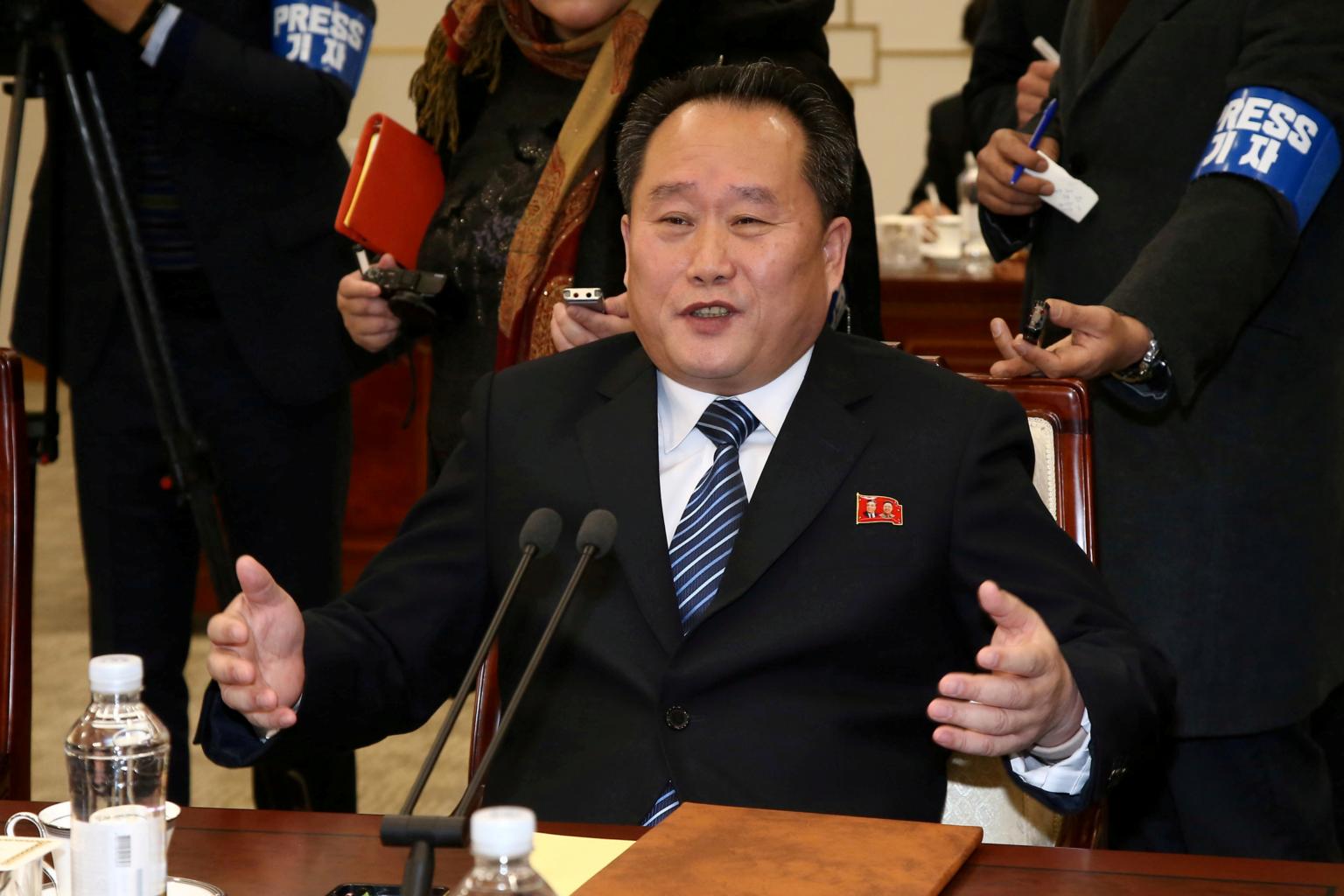Efforts to denuclearise North Korea to continue despite arrival of hardliner new foreign minister Ri Son Gwon
Sign up now: Get insights on Asia's fast-moving developments

Head of the North Korean delegation, Ri Son Gwon talks with his South Korean counterpart Cho Myoung-gyon (not pictured) during their meeting at the truce village of Panmunjom in the demilitarised zone separating the two Koreas on Jan 9, 2018.
PHOTO: REUTERS
Follow topic:
WASHINGTON (NYTIMES) - Efforts to denuclearise North Korea will continue despite a new foreign minister in Pyongyang who is seen as a hard-liner and could take a tougher stance in stalled negotiations, a senior State Department official said Wednesday (Jan 22).
The official would not forecast how the new foreign minister, Ri Son Gwon, who succeeds Ri Yong Ho, might approach negotiations with the United States over removing nuclear weapons from the Korean Peninsula.
The official, citing diplomatic protocol to speak on the condition of anonymity, predicted the talks would restart, given what he said was a shared desire for progress on the part of President Donald Trump and the North Korean leader, Kim Jong Un.
Despite frequent setbacks in the past year, Trump administration officials have publicly said they intend to continue with negotiations to settle on a denuclearisation process, echoing Trump's line. Privately, though, some officials acknowledge that the administration has gotten nowhere and that there is no sign the North will give up its nuclear weapons.
Ri Yong Ho's removal was first reported Saturday by NK News, based in Seoul.
The move was interpreted as a sign of further turmoil among the ranks of North Korean officials responsible for negotiating with the Trump administration and getting the US to lift sanctions.
Kim and Trump opened the talks in 2018 in Singapore. But those fell apart after the two leaders met again in February 2019, in Hanoi, Vietnam, prompting Kim to dismiss his negotiating team.
Among those sidelined was Kim Yong Chol, a former spy chief and top party official who was seen as the counterpart to Secretary of State Mike Pompeo and oversaw the North's negotiating team in Hanoi. Kim Yong Chol also had clashed with Pompeo in several meetings and, in July 2018, North Korea said the United States had made a "gangster-like demand" for denuclearisation when the top US diplomat visited Pyongyang.
Last September, Ri Yong Ho did not attend the United Nations General Assembly in New York, even though he had shown up in previous years and even rebuked Trump in his speeches there.
Ri Son Gwon, the incoming foreign minister who has served as an Army colonel, was an aide to Kim Yong Chol years ago.
In another shift of senior leadership, North Korea has replaced the defence minister, according to a report Wednesday in Rodong Sinmun, an official newspaper of the Workers' Party of Korea. The new official, Kim Jong Gwan, is an Army general.
"They come and go, so it's pretty hard to put a lot of analytical freight on the new appointment," said Robert Carlin, a former CIA and State Department analyst on North Korea.
Carlin said the calculus of the United States in negotiations was still the same. And he noted that much depended on the next steps that the North's leader takes, in particular whether he carries out another nuclear test or an intercontinental ballistic missile test.
The State Department official shrugged off suggestions that Russian and Chinese diplomats had dissuaded North Korea from carrying out a major weapons test - something US officials had expected - and that the North Korean leader had described as a possible "Christmas gift" for Trump.
Kim had given the Americans until the end of last year to make what he would consider a genuine offer that would result in the lifting of sanctions. However, instead of a weapons test, he warned that North Korea was developing a new strategic weapon. The North Korean leader also ridiculed the impasse that he said would result in the United States becoming "more helpless" against the North.
In December, Stephen Biegun, the deputy secretary of state and main negotiator on North Korea, travelled across East Asia to discuss the North Korea sanctions with China and to indicate to North Korea that the Americans were willing to continue talks.
Kim Jong Un, at a Communist Party meeting Dec 28, called for "offensive measures" to strengthen security.
An earlier round of talks Biegun had with North Korean officials in Stockholm in October ended badly after the North Koreans read from a long, pre-written letter berating the Americans. The North then said it had no desire to continue what it called "sickening negotiations."

